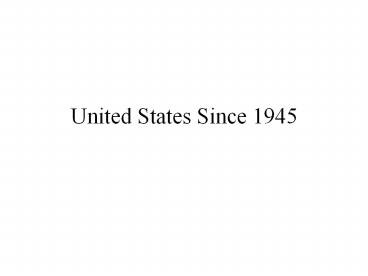United States Since 1945 - PowerPoint PPT Presentation
1 / 14
Title:
United States Since 1945
Description:
Chinese Attack: Nov.1950-March 1951. Stalemate:March 1951-July 1953 ... Rise of the Viet Cong and the Birth of the NLF: Rooted in opposition of Diem ... – PowerPoint PPT presentation
Number of Views:141
Avg rating:3.0/5.0
Title: United States Since 1945
1
United States Since 1945
2
Introduction
- United States in 1945
- Reactions to the end of the war Ecstasy
Concern - Partying
- What would happen next
- Quest for security a theme for this time
- Security at home economic security
- Security abroad focus on national defense
3
Quest for economic security 1945-1972
- Strategy for maintaining economic security Mixed
economy. New Deal Approach and the market economy - Securing activist government, Step One Harry
Trumans Fair Deal - Importance of the 1948 presidential election
- Republican reaction to defeat Exploit the Second
Red Scare - Alger Hiss Case the Rise of Joe McCarthy
4
Quest for economic security 1945-1972(Cont.)
- Securing activist government Step Two The Ike
Years Eisenhower as President - Eisenhowers victory in 1952
- Eisenhowers role in securing activist government
- Ending the Second Red Scare
- Limited Extension of Activist government
- National Defense Highway Act of 1956
- Rejecting a change in course. Eisenhower wanted
Republicans to accept the New Deal Approach - United States in 1960 a consensus
5
Quest for economic security 1945-1972(Cont.)
- Great Society 1960-1972
- Three presidencies John F. Kennedy, Lyndon B.
Johnson, Richard M. Nixon. Johnson proposed the
Great Society in 1965 - Second Reconstruction Three branches of federal
government attack racial injustice - Supreme Court Brown v Topeka Board of
Education-1954 - President Eisenhower 1957 in Little Rock, AR
- Congress enacts Civil Rights laws in 1957, 1960,
1964, 1965, 1968
6
Quest for economic security 1945-1972 (cont.)
- Great Society 1960-1972 (Cont.)
- War on Poverty
- Federal government attempted to wipe out poverty
in an affluent society. Major attempt to grapple
with the Old Poverty a la 1930s. - Concept of a culture of poverty
- Environmental Protection
- Birth of the Environmental Protection Agency
(EPA) 1970
7
Declining Trust in government converted to a
rejection of activist government
- Stagflation Stagnant economic growth
Inflation - Imperial Presidency
- Effects of Vietnam War Credibility Gap
- Effects of Watergate Affair Presidency not
trustworthy - Roles of New Left and Counterculture
- Neo-conservative intellectuals provide muscle
power
8
Declining Trust in government converted to a
rejection of activist government
- Ronald Reagan as President
- Provides charismatic leadership to transform
anti-government mood into an effective political
force - Program centered on Government was not the
solution to the problems government was the
problem.
9
Cold War 1945-1991
- Sources of the Cold War
- Sovietization of Eastern Europe after World War II
10
Cold War 1945-1991 (cont.)
- Strategy for Fighting the Cold War
- Birth of Containment Role of George Kennan as
the Father of Containment - Pillars of Containment
- Harry Truman declared the Cold War with the
Truman Doctrine (1947) - George Marshall proposed the Marshall plan to
stimulate economic recovery in Western Europe
(1948) - North Atlantic Treaty Organization (1949). United
States joined a peacetime military alliance.
Applied Collective Security - NSC 68 (1950). Built up U.S. military power
globally
11
Cold War 1945-1991(cont.)
- Korean War 1950-1953 4 stages
- North Korean Invasion June-Sept. 1950
- United Nations counterattack Sept.-Nov. 1950
- Chinese Attack Nov.1950-March 1951
- StalemateMarch 1951-July 1953
- Armistice signed July 27, 1953
12
Cold War 1945-1991(cont.)
- Vietnam War
- Vietnam's Background as a French colony
- Rise of Ho Chi Minh and the Viet Minh
- World War II
- First Indochina War 1945-1954
- Viet Minh victory at Dien Bien Phu May 1954
- Geneva Accords 1954
- Nation-Building 1954-1964
- U.S. Goal Secure non-Communist government in the
south - Ngo Dinh Diem 1954-1963
- Rise of the Viet Cong and the Birth of the NLF
Rooted in opposition of Diem - November 1, 1963 coup detat
- Gulf of Tonkin Resolution August 1964
13
Cold War 1945-1991(cont.)
- Vietnam War (cont.)
- United States at war
- Decision for deeper involvement Operation
Rolling Thunder July 1965 decision - U.S. Strategy Use fire power to win war of
attrition - Nature of the military side
- Role of Selective Service. OR how the Draft
worked - Casualties Almost 60,000 U.S. service personnel
died in the war while 300,000 were injured - Stalemate 1965-1968
- Declining support at home for the policy
College-based anti-war movement, loss of
political support, Lets win the war and get
out! - Signs of success, but
14
Cold War 1945-1991(cont.)
- Vietnam War
- Tet Offensive Jan.-Mar. 1968
- United States policy now emphasized negotiations
- Nixons policy to end the war
- Fire power
- Vietnamization
- Open and secret negotiations. Role of Henry
Kissinger - Truce Agreement January 1973 in Paris, France
- End of the Cold War the Collapse of the Soviet
Union - Reagan pushes, the Soviet Afghan War (1979-1989),
and the role of Mikhail Gorbachev
















![[PDF] DOWNLOAD The United Arab Emirates: A Modern History (Routledge L PowerPoint PPT Presentation](https://s3.amazonaws.com/images.powershow.com/10136528.th0.jpg?_=20240923066)














